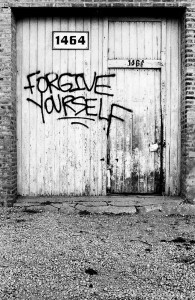Discovering How to Forgive Yourself
I met a man recently who was struggling to forgive himself. He had made a big mistake in his marriage, and as a result he was separated from his family, and it was tearing him up on the inside, and wrecking his life on the outside. His journey was having some very interesting, and positive side-effects though. He was becoming what I would call “a seeker”. If you’re grappling with how to forgive yourself, I’ve included an excerpt from my new book that deals with this question directly. It is a book on how to forgive. You are just one of the many parties that you need to forgive if you are navigate life well. The book is called “Cheaper Than Therapy”. You can find the link to buy the book on this website. Either way, I hope that this helps you on your journey to processing how to forgive yourself.
One party we cannot forget is ourselves in the forgiveness process. The debts we owe ourselves fall into two categories: guilt and regret.
Guilt: You did it, you were at fault. Your actions wounded one or more people (this may include you).
Regret: You let it happen, you had the power to stop it, but you didn’t. You could have prevented one or more people from getting hurt, but you did not (you may have been unaware or done it unintentionally).

Forgive Yourself
Discovering How to Forgive Yourself
Forgiving yourself can be the most difficult of all types of debts. It takes discipline and focus to account for the deficit, and forgive it. You can’t be lazy, or allow yourself concessions, as your heart will still pursue the debt if you give yourself a “staff discount”.
If you have hurt others, or yourself you may end up developing the same negative emotions, thoughts and behaviour of a victim. One study noted this behaviour in people who hurt others, as they frequently exhibited feelings of sadness, shame and guilt.
Guilt and Shame aren’t mutually exclusive. You can experience both together.
Guilt: “I’m Sorry For What I Did”
Even if you are a mass murderer, you will have some kind of code or standard that guides the way you operate. In the Italian mafia, every gang operates according to a strict rule of “omerta” – a code of silence ensuring loyalty to family. Even those with extremely flexible morals, have some kind of code they live by, however loose. When your actions violate your code, you may experience guilt. How aware of the guilt you are, and how you suppress it will differ depending on who you are.
Some people feel an intrusive sense of guilt. Perhaps it was a religion, school or family member who used fear and guilt to scare you in order to make you conform to certain behaviours. Morals is an old fashioned word, but most people have things they won’t do.
Guilt can be a cycle: 1) make a mistake, 2) experience guilt and shame, 3) experience remorse and sorrow, 4) return to previous agreement, 5) repeat. It starts by doing something we said we wouldn’t, then feeling ashamed because of this. We then make amends, determining to change our direction (repent), we “forgive and forget” the pain we felt when we were ashamed, and just as we start feeling good about ourselves, we do it again and start the cycle all over again.
It might be the impact your actions had on others. It might be the way you handled your role as a father, mother, husband, or wife. It might have been a single big moment that altered the rest of your life, or a whole lot of little moments that led to an outcome you really regretted. We’ve all done things we’ve felt guilty about, it’s par for the course that you’re going to screw up. The real question is how to deal with these let downs, and how do we keep “getting back on the horse”? It has to begin by being fully accountable to ourselves. Although our heads will automatically want to let ourselves off the hook, our hearts will not let this happen. For complete forgiveness of debts to happen, we must listen to our hearts, not our heads
We can’t unsleep with someone, unmurder someone, or unslander someone. What is done is done. We may find that we do something – either calculated or in the heat of the moment (more often the latter) that we later regret, but which we cannot now change. We shouldn’t try to explain it away with excuses. Face the debt, fully account for it. And then forgive it.
Regret: “I’m Sorry For What I Didn’t Do”
Regret is what we experience when something is not done, that should have been (and usually is) within our power to. It may often involve other people or circumstances or that we could have stopped a negative outcome from occurring, but because we didn’t, people ended up getting hurt (including ourselves). We may have been fully aware of the results of our actions. Or we may have been completely unaware.
When we’re not aware that our actions were going to end in disaster, it’s common to say “if only I had done …”. We replay it over and over again. It’s okay to think this. Whatever our heart feels owed, we should fully account for it, and then cancel the debt.
There is usually no way of having a second bite of the cherry when it comes to regret. That doesn’t mean we have to carry them around as a chip on our shoulder for the rest of our life. The reality is that every person makes mistakes. Those who succeed learn from these mistakes constructively. Neither guilt nor regret are constructive ways of learning from a mistake if we let them fester and hang around like a bad smell.
The post Discovering How to Forgive Yourself appeared first on MyKeyRobinson.com.



